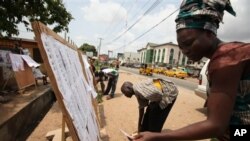Nigeria’s Independent National Electoral Commission (INEC) is grappling with how to implement a court decision reversing the order of elections. Earlier the commission had listed the presidential and parliamentary election as coming first, with state and local elections following. But the opposition Labor Party won a court order saying if the presidential election is held first, it will unfairly benefit the ruling PDP, if its candidate, President Goodluck Jonathan, wins.
The judiciary has a role in ensuring that elections are held according to the law, says Godwin Onu, professor of political science and rector of Federal Polytechnic Oko in the southeastern state of Anambra.
But he says while the courts must help provide a level playing field, this decision could force INEC to postpone the elections.
“In this particular circumstance,” he says, “the issue we have is not really which election comes first, but ensuring that every vote [counts].”
He says the Labor Party, which brought the case before the courts, had a right to challenge the timetable if it believed the ruling PDP would have an advantage.
“Nigeria has never had a history of credible elections before and the tradition is not there. As far as the Labor Party is concerned, the fear is real and… could be shared by other Nigerians,” he says.
Onu expresses concern that judicial rulings may force INEC to delay the polls if it’s unable to comply on time.
“That is a major implication because the role of the judiciary in the whole affair is becoming increasingly disturbing. There are court orders all over the place and counter court orders and it’s beginning to disturb Nigerians.”














